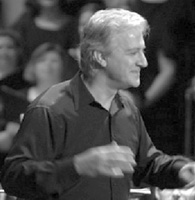home | north bay bohemian index | music & nightlife | profile

Hometown culture: The idea of a small town having its own philharmonic is one that is catching on across the nation.
High Priest
Gabriel Sakakeeny, mighty missionary of music
By David Templeton
Ever since the Cotati Philharmonic gave its first free concert seven years ago in the tiny, proudly eccentric town of Cotati, maestro Gabriel Sakakeeny has acquired a reputation as a kind of musical holy man, an outspoken philosopher whose view of music and the arts is not unlike what some preachers feel about faith and scripture. To many, in fact, Sakakeeny is Sonoma County's mighty missionary of music, the Reverend of rhapsody, the cleric of classical culture. Hell, some days, he even thinks of himself that way. And if Sakakeeny has his way, all musicians--amateur and professional--would begin to think of themselves as holy women and holy men of music.
"A lot of pros end up thinking of music as just their job, and they get about as excited at the thought of performing as others get about clocking in at the office," he says. "My dream is for musicians--professional musicians and all others who are lucky enough to have an orchestra or band or chamber group to play in, and especially musicians in America--to someday begin identifying themselves as the high priests of music and beauty. When that happens, this country will undergo a musical revival that will be absolutely explosive. It'll turn the culture upside down."
That lofty and optimistic goal is not just Sakakeeny's own personal dream; it's the bedrock mission of the American Philharmonic Association (APA), the five-year-old organization of which Sakakeeny is president. In line with its APA affiliation, the Cotati Philharmonic recently formally changed its named to the American Philharmonic-Sonoma County.
At first, the notion of a town the size of Cotati having its own philharmonic was a cute and whimsical novelty. After a few years, when it became clear that this group was indeed beloved by those unfamiliar with the tonal intricacies of Mahler, the whimsy wore off and the Cotati Philharmonic was viewed as what it always was: the real thing, not cute at all, but seriously dedicated to the emotional thunder of great music played with passion.
The recent name change is not a change of direction or vision for the growing volunteer-based ensemble. More accurately, it's a reflection of the group's readiness to take their mission to the next level.
"In some ways," says Sakakeeny, "it is a recognition of having finally grown up. Over the last seven years, we've gone from being an ad hoc collection of committed people who wanted to contribute something to what is emerging as a major force in the symphonic world of the North Bay. Changing our name is the equivalent of graduating, getting a car and moving out of the house."
Sakakeeny and his 70-plus musicians have gradually become aware that the self-identity of their orchestra, the way they have been thinking about themselves for seven years, has not been in line with the actual impact they have recently been making. Funded at a modest $40,000 annual budget entirely with donations and grants and performing 18 times last year, the philharmonic is creating some serious buzz. What Sakakeeny and the orchestra have created in Cotati is more than an entertainment or community service--it is part of a nationwide musical movement in which small towns across the nation embrace the concept of having their own all-volunteer, fully democratic philharmonic orchestras.
One goal of the APA is to establish a total of 25 regional American Philharmonics over the next quarter century. The growing town of Surprise, Ariz., will join the ranks in 2008 with the debut performance of its American Philharmonic-Surprise. The city of Surprise is currently building a 1,500-seat concert hall for the ensemble, which will become its rent-free home. That's how serious the notion of a hometown philharmonic is being taken.
While his own orchestra remains without a concert hall, Sakakeeny believes that he and his musicians get far more out of being in the philharmonic than they put into it.
"There's the whole thing about contributing something for no reason except to do it, because you're passionate about it, and you want to share that with other people--that's a spiritual payback," he says. "It's uplifting and inspiring. It's always an incredibly moving thing. It's truly spiritual."
Currently rehearsing for the big season opener on the weekend of Oct. 21, the philharmonic is not squeamish when it comes to tackling the greatest and most difficult compositions. The opener, for which the orchestra will be joined by Sonoma's violin włnderkind Nigel Armstrong, will include Beethoven's "Leonore" Overture no. 3, three works by Saint-Saëns and Brahms' Symphony no. 3.
To Sakakeeny, there's nothing better than doing a concert and witnessing the way the music affects and surprises so many people.
"Baby boomers, with no real experience with concert music, come up with tears in their eyes," he says. "They say things like, 'Oh my God, I had no idea. I've never been to the orchestra and I wouldn't have come tonight if it hadn't have been free--and you blew my brains out! I'll bring my family to this kind of thing from now on and forever.' And then they go out and buy Santa Rosa Symphony tickets because now they get it.
"It's like they've been converted," Sakakeeny laughs. "And that really is our mission, like a secular-spiritual-artistic mission, to win converts to the almighty power of classical music."
The American Philharmonic-Sonoma County performs Friday-Sunday, Oct. 21-23, at the Spreckels Performing Arts Center. Friday-Saturday at 8pm (Friday is a dress rehearsal); Sunday at 3pm. 5409 Snyder Lane, Rohnert Park. Free; donations hugely welcomed. 707.793.2177.
Send a letter to the editor about this story.
|
|
|
|
|
|